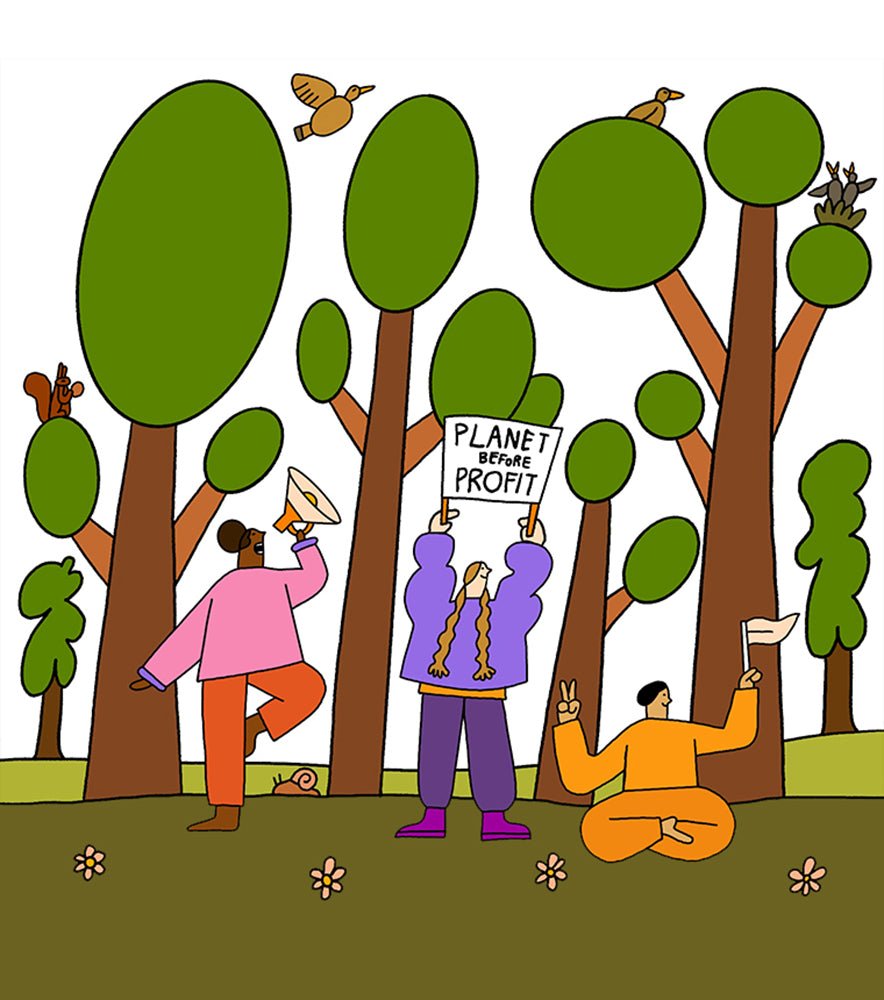Sad, nervous, angry, powerless, helpless and guilty - this is how more than two thirds of young people in Germany feel about the climate crisis.1 These emotions are often summarised under a single term, "climate anxiety" - a feeling that is not only familiar to young people and is certainly not unfounded.
Although the majority of people in Germany perceive climate change as a serious threat, many have not yet managed to change their behaviour accordingly.2 The greater the imbalance between the perceived risk and the perceived options for action, the more likely it is that defensive reactions such as denial or procrastination will occur - or that people will become rigid in their fear.
How do we cope with fear?
"Many people lack [...] the feeling that they can change something themselves," says Gerhard Reese, Professor of Environmental Psychology at the University of Koblenz-Landau. From an evolutionary perspective, we have not learnt how to deal with a threat such as climate change. "Some human thought patterns that have been useful for human survival in the course of evolution - for example, because they have helped us to filter information or react quickly - are actually a hindrance when it comes to climate change. "3 From an evolutionary perspective, there are only three courses of action that humans take in dangerous situations: attack, flee or play dead. Avoiding the confrontation with the climate and suppressing the issue could therefore be compared to fleeing or playing dead.
Beyond the evolutionary aspect, there are other processing steps in our brain that make sustainable action more difficult. "Two processes run simultaneously in our brain: on the one hand, the experience-based process, which is fast and emotional. On the other hand, the analytical one, which is slower and less emotional," explains Torsten Grothmann from the Chair of Ecological Economics at the University of Oldenburg.4 Accordingly, this is the analytical level at which we realise that the climate crisis poses a threat. Personally, however, very few people in Germany are acutely affected by this threat. The general experience therefore speaks against the analysis, which is why the two processing methods lead to different results. In this case, the experience-based assessment usually prevails. In the meantime, however, experience is also changing in Germany. "The feeling of being affected has increased," says Grothmann.5
Much more important for a change in our behaviour, however, is that we are very much guided by how the people around us behave. In a large part of Western society, a consumption-orientated, CO2-intensive lifestyle is still the norm, which many use as justification: why should I give up meat or long-distance flights when everyone around me is not?
The role of the individual
But how important is it for individuals to do without? The idea of the personal ecological footprint has been around for 30 years now. Initially invented by Mathias Wackernagel and Bill Rees as part of a doctoral thesis to calculate the emissions of cities and countries, the concept was instrumentalised by the oil company BP for an extremely successful advertising campaign in the early 2000s. The company skilfully diverted attention from the massive carbon footprint of oil companies to individuals by launching a calculator that allowed individuals to calculate their personal footprint.
However, no individual can bring about the change that is necessary to achieve the 1.5 degree target simply by (refraining from) consumption. This is also shown by the ecological footprint: scientists at MIT have calculated that even a homeless American without a car would have a footprint of over 8 tonnes of carbon dioxide per year.6 And the corona lockdown has also proven this: Even if the world stands still, we emit too much CO2. At that time, global emissions only fell by around seven per cent.7 So what we need is a collective change in politics, the economy, mobility and agriculture.
Climate crisis and societal change
And this is becoming increasingly difficult. How people deal with knowledge about climate change depends largely on their ideological standpoint. A US study shows, for example, that people who were close to the Republicans nevertheless assessed the threat less as their knowledge of climate change increased. This is due to the filter function in our brain, which helps us to memorise information by filtering out what is important. However, knowledge is also twisted and distorted in the process - because in the end, we mainly memorise what corresponds to our own values and norms. Anything that doesn't fit the picture is suppressed or doubted. "For many Republicans, it is part of their ideology that climate change either does not exist or that it is not caused by humans. It's similar for AfD supporters. "8
As if this were not problematic enough in itself, the interplay between the orientation towards others and the selective choice of knowledge also leads to the political camps moving further and further apart. In a threatening situation, people follow their own group even more closely, which means that those on the left become more left-wing and those on the right more right-wing.9
“The revolution won’t happen by people staying home and being good.”10
- Rebecca Solnit
Climate chaos requires us to recognise how everything is connected. Author Rebecca Solnit traces the inner conflict some of us are familiar with back to the question of whether we identify ourselves as consumers or citizens. "Consumers define themselves by what they buy, own, look at - or not. Citizens see themselves as part of civil society, as actors in the political system. "11 However, individual and collective action do not have to be mutually exclusive - rather, it is crucial that we become active on both levels.
Text: Kathrin Weins
Illustration: © Tanya Teibtner
